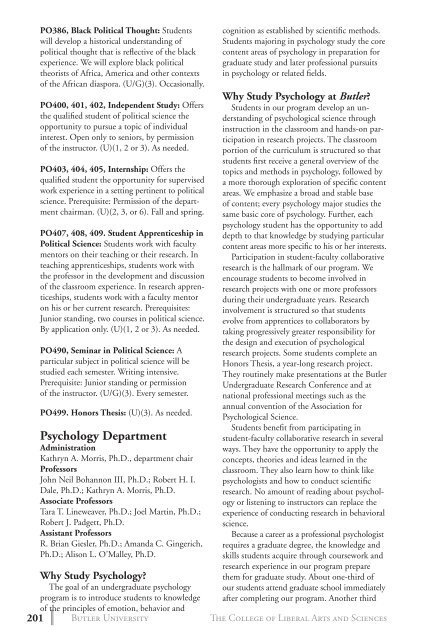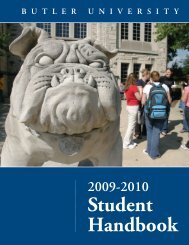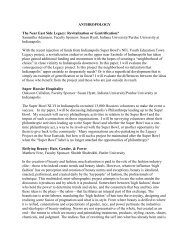2 0 1 3 bulletin - Butler University
2 0 1 3 bulletin - Butler University
2 0 1 3 bulletin - Butler University
You also want an ePaper? Increase the reach of your titles
YUMPU automatically turns print PDFs into web optimized ePapers that Google loves.
PO386, Black Political Thought: Students<br />
will develop a historical understanding of<br />
political thought that is reflective of the black<br />
experience. We will explore black political<br />
theorists of Africa, America and other contexts<br />
of the African diaspora. (U/G)(3). Occasionally.<br />
PO400, 401, 402, Independent Study: Offers<br />
the qualified student of political science the<br />
opportunity to pursue a topic of individual<br />
interest. Open only to seniors, by permission<br />
of the instructor. (U)(1, 2 or 3). As needed.<br />
PO403, 404, 405, Internship: Offers the<br />
qualified student the opportunity for supervised<br />
work experience in a setting pertinent to political<br />
science. Prerequisite: Permission of the department<br />
chairman. (U)(2, 3, or 6). Fall and spring.<br />
PO407, 408, 409. Student Apprenticeship in<br />
Political Science: Students work with faculty<br />
mentors on their teaching or their research. In<br />
teaching apprenticeships, students work with<br />
the professor in the development and discussion<br />
of the classroom experience. In research apprenticeships,<br />
students work with a faculty mentor<br />
on his or her current research. Prerequisites:<br />
Junior standing, two courses in political science.<br />
By application only. (U)(1, 2 or 3). As needed.<br />
PO490, Seminar in Political Science: A<br />
particular subject in political science will be<br />
studied each semester. Writing intensive.<br />
Prerequisite: Junior standing or permission<br />
of the instructor. (U/G)(3). Every semester.<br />
PO499. Honors Thesis: (U)(3). As needed.<br />
Psychology Department<br />
Administration<br />
Kathryn A. Morris, Ph.D., department chair<br />
Professors<br />
John Neil Bohannon III, Ph.D.; Robert H. I.<br />
Dale, Ph.D.; Kathryn A. Morris, Ph.D.<br />
Associate Professors<br />
Tara T. Lineweaver, Ph.D.; Joel Martin, Ph.D.;<br />
Robert J. Padgett, Ph.D.<br />
Assistant Professors<br />
R. Brian Giesler, Ph.D.; Amanda C. Gingerich,<br />
Ph.D.; Alison L. O’Malley, Ph.D.<br />
cognition as established by scientific methods.<br />
Students majoring in psychology study the core<br />
content areas of psychology in preparation for<br />
graduate study and later professional pursuits<br />
in psychology or related fields.<br />
Why Study Psychology at <strong>Butler</strong>?<br />
Students in our program develop an understanding<br />
of psychological science through<br />
instruction in the classroom and hands-on participation<br />
in research projects. The classroom<br />
portion of the curriculum is structured so that<br />
students first receive a general overview of the<br />
topics and methods in psychology, followed by<br />
a more thorough exploration of specific content<br />
areas. We emphasize a broad and stable base<br />
of content; every psychology major studies the<br />
same basic core of psychology. Further, each<br />
psychology student has the opportunity to add<br />
depth to that knowledge by studying particular<br />
content areas more specific to his or her interests.<br />
Participation in student-faculty collaborative<br />
research is the hallmark of our program. We<br />
encourage students to become involved in<br />
research projects with one or more professors<br />
during their undergraduate years. Research<br />
involvement is structured so that students<br />
evolve from apprentices to collaborators by<br />
taking progressively greater responsibility for<br />
the design and execution of psychological<br />
research projects. Some students complete an<br />
Honors Thesis, a year-long research project.<br />
They routinely make presentations at the <strong>Butler</strong><br />
Undergraduate Research Conference and at<br />
national professional meetings such as the<br />
annual convention of the Association for<br />
Psychological Science.<br />
Students benefit from participating in<br />
student-faculty collaborative research in several<br />
ways. They have the opportunity to apply the<br />
concepts, theories and ideas learned in the<br />
classroom. They also learn how to think like<br />
psychologists and how to conduct scientific<br />
research. No amount of reading about psychology<br />
or listening to instructors can replace the<br />
experience of conducting research in behavioral<br />
science.<br />
Because a career as a professional psychologist<br />
requires a graduate degree, the knowledge and<br />
skills students acquire through coursework and<br />
research experience in our program prepare<br />
them for graduate study. About one-third of<br />
our students attend graduate school immediately<br />
after completing our program. Another third<br />
Why Study Psychology?<br />
The goal of an undergraduate psychology<br />
program is to introduce students to knowledge<br />
of the principles of emotion, behavior and<br />
201 <strong>Butler</strong> <strong>University</strong><br />
The College of Liberal Arts and Sciences
















